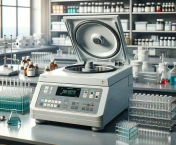What is a Reagent?
Published on January 24, 2024
What are reagents?
If you have ever taken any laboratory tests, you’ve already utilized the usefulness of chemical reagents for your needs. To understand the reagents meaning in chemistry, let’s explore the basic definitions of laboratory reagents and their uses.
To begin with, according to the definition from chemistry schoolbooks, a reagent is any type of solution, either organic or inorganic, that is used to facilitate certain chemical reactions. Such a property makes chemistry reagents quite useful solutions in terms of exploring the presence of other substances as well. That’s why they are often used in laboratory tests and experiments.
Beginners might often confuse reagents with reactants, which is a big mistake in terms of their functionality. While both reagents and reactants trigger chemical chains, reactants are consumed in the process. In biochemical reactions, reagents are called catalysts.
Different types of reagents
When you want to find out what is a reagent in microbiology, you need to understand that different chemical reagents have different properties and are used in different experiments for different purposes. Let’s make the clear distinction between the most frequently used types of reagents in chemistry:
- Acidic Reagents: This type of reagent is used when the experiment requires acidic conditions. Sulfuric acid and hydrochloric acid are the most well-known acids used as reagents.
- Basic Reagents: These are substances that can accept hydrogen ions or donate electron pairs in chemical reactions. In simpler terms, they have the capacity to neutralize acids. Basic reagents are commonly used in acid-base reactions and are characterized by their pH levels, which are above 7. Examples of basic reagents include sodium hydroxide (NaOH), potassium hydroxide (KOH), and ammonia (NH3). These substances are often utilized in laboratory settings for neutralization reactions, saponification processes, and in the extraction of acidic compounds.
- Oxidizing Reagents: Oxidizing reagents, on the other hand, are chemicals that have the ability to accept electrons from other substances during a reaction, thereby undergoing reduction themselves. These reagents are crucial in redox (reduction-oxidation) reactions. They play a vital role in various chemical and industrial processes, including combustion, corrosion, and in various synthetic procedures in organic chemistry.
- Reducing Reagents: Reducing reactions are the ones during which certain compounds need to give up electrons and reduce other substances. Reducing reagents are the solutions that perform this function.
- Precipitating Reagents: These solutions appear quite efficient in water purification procedures. Based on their properties, such commercially known reagents as CaO and CaCO3 are able to precipitate toxic metal ions from sewage.
Reagent kits and how affect our lives
Reagent kits are special tools that can be used in different conditions, both laboratory and non-laboratory ones, to detect the presence of certain solutions in a substance. Their work is pretty simplified — when the solution is detected the reagent kit will change its color. This simplicity and usefulness have contributed to the wide use of reagents in different areas of our routine lives. Here are some laboratory and non-laboratory reagents examples:
- Water purification: As mentioned above, precipitating reagents are quite frequently used to eliminate harmful microorganisms and toxic elements from water, making them safer to use in both routine life and industrial processes.
- Agriculture: Reagents like ammonium nitrate serve as fertilizers, enhancing plant growth and yield. Pesticides and herbicides, which contain various chemical reagents, are used to control pests and weeds.
- Pregnancy test: Monoclonal antibody reagents are able to detect elevated levels of hCG in serum or urine specimens, which will indicate pregnancy of a female individual taking the test.
- Healthcare: Different types of reagents are used to formulate various medicines, which makes them an integral part of the healthcare industry. What’s more, reagents might be used in drug detection or in tests that help to define certain diseases.
- Photography: If you are fond of taking traditional pictures with film cameras, you’ll need reagents to later develop the photograph.
These are the areas where reagents are used the most frequently, meaning this list is not complete and might also include more important sectors.
Conclusion
On the whole, for almost any laboratory test or experiment you will need a certain solution that will catalyze the reaction. Thus, it’s important to pay close attention to the properties of different reagent types and use them accordingly.
Comments (0)
Similar Posts
What is the point in wetting filtration paper in buchner funnel?


